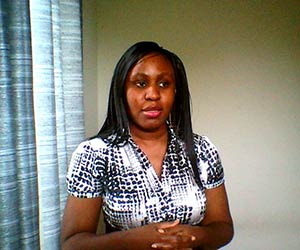
“Although I live in the United States now, my heart beats for Africa,” says Chinonso Nnorom, a Doctor of Public Health (DrPH) candidate and inaugural Social Change Fellow. “My doctoral journey has made me realize that I can take that leap and help create something that empowers Africans to be the best they can be, and in turn, give back to Africa.”
For Nnorom, her drive to make a difference began when she was a little girl in Nigeria. “I always knew I was going to pursue a doctoral degree. My mother often said that ‘education for the girl child is not a compromise’ as she pushed me and my sister to study for the highest level possible.”
After earning her undergraduate degree in zoology in her home country, Nnorom realized her place wasn’t in the animal world. “I constantly saw a gap in my environment, and I wanted to make a change,” she said of her decision to pursue a Master of Public Health (MPH) at the University of Ibadan in Nigeria. “Public health has allowed me to promote wellness and protect the health of people in so many ways because it handles governance, policy, leadership, and education. Public health helps us study the human race and how we can make life better for everyone.”
Now, as a doctoral candidate at Walden, she sees herself contributing to knowledge through research and practice, and helping the next generation of social change fellows through teaching. “I wanted a DrPH because I understood the program was where things actually happen—a practice-based program for people who really wanted to get empowered and add value in the field of public health.”
Her dissertation, Health System Determinants of Access to Maternal Health Medicines: An Analysis of WHO Low- and Middle-Income Country Profiles, investigates the association between health system building blocks and pregnant women’s access to oxytocin, misoprostol, and magnesium sulfate in low- and middle-income countries. Nnorom’s study aims to understand, in the face of competing demand coupled with shrinking budgets, where money should be invested in maternal health that would produce better results. The study topic was informed by both her professional and personal experience.
Nnorom previously worked as a public health educator for the nonprofit organization ActionAid International Nigeria, visiting communities and working with them to identify issues and find solutions that use the resources immediately available to them. She also served as a policy fellow with UNAIDS in Geneva, where she was then hired by Nigeria to participate in governance and international-level interventions within the healthcare sector. In the U.S., she led a portfolio of research studies for an international nonprofit that advocated for women’s rights and access to quality healthcare.
It was also her personal experience that brought her country’s issues to light. “I was visiting Nigeria while I was pregnant and I started cramping and bleeding severely. My dad put me in the car and we started driving to the hospital. We visited three hospitals but couldn’t receive any healthcare because government hospitals were on strike and private hospitals weren’t properly staffed—they all claimed that no doctors were on duty. After reaching out to everyone we knew, we learned of a small private hospital, and it was a blessing they opened up their doors.” Had she been poor, Nnorom believes she would have probably lost her baby as well as her own life. “There are systemic issues that are breaking us, but I believe strongly that with education and the right resources, we can invest in us, in Africa—in our future. In Africa, we need us to succeed.”
As a Social Change Fellow, Nnorom will receive funding to carry out projects with a demonstrable social change impact, present research outcomes to the university community, and serve in an advisory capacity to the president on advancing the university mission. “I feel so honored to be a Fellow,” she says. “It makes me feel that my heart is seen and appreciated.”
—Jen Raider



